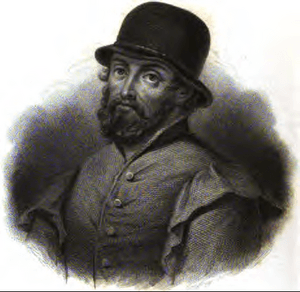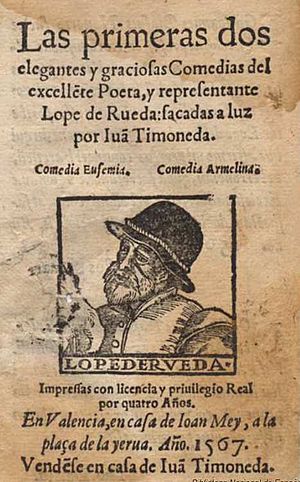Lope de Rueda facts for kids
Quick facts for kids
Lope de Rueda
|
|
|---|---|
 |
|
| Born | c.1505<1510 |
| Died | 1565 |
| Nationality | Spanish |
Lope de Rueda (born around 1505-1510, died 1565) was an important Spanish playwright and writer. Many people thought he was the best writer of his time. He wrote many different types of plays, including comedies and short, funny plays called pasos. He helped set the stage for what is known as the Golden Age of Spanish literature.
His plays are seen as a link between earlier writers and later famous ones like Lope de Vega.
Contents
Early Life of Lope de Rueda
Lope de Rueda was born in Seville, Spain, in the early 1500s. The famous writer Cervantes said that Lope de Rueda worked as a metal-beater when he was young.
By 1554, Lope de Rueda was acting in plays, often playing funny characters. Between 1558 and 1561, he managed a traveling theatre group. They performed in many Spanish cities like Segovia, Seville, Toledo, Madrid, Valencia, and Córdoba. Cervantes, who was a child then, remembered seeing Lope de Rueda and his group perform.
Lope de Rueda's Works
Lope de Rueda's plays were published after he died, in 1567, by Timoneda. Some parts of the plays were changed to be less strong.
Lope de Rueda wrote longer plays that were often based on Italian stories. For example, his play Eufemia was inspired by Boccaccio. His play Los Engañados (meaning The Deceived) came from an Italian comedy.
But Lope de Rueda was especially good at writing his own short, funny plays called pasos. These plays were full of humor and showed a lot about everyday life. He was very skilled at writing natural-sounding conversations. Some of his famous pasos include Las accitunas (The Olive Trees) and El condidado (The Guest).
He also wrote a rhyming play about shepherds called Discordia y cuestion de amor. Another play, Auto de Naval y Abigail, was a religious play based on a Bible story.
Lope de Rueda didn't like plays that used fancy words or relied too much on sudden, magical solutions to problems.
Before Lope de Rueda, most plays were for royal courts or for people to read. But Lope de Rueda and his traveling actors made theatre popular for everyone. Both Cervantes and Lope de Vega agreed that Lope de Rueda was the true founder of Spanish national theatre.
Modern Adaptations of His Plays
Between 1980 and 1990, nineteen of Lope de Rueda's pasos were translated into English. They were performed nightly for five years in St. Augustine, Florida, by a group called the St. George Street Players.
Personal Life
Lope de Rueda was married twice. His first wife was an actress, singer, and dancer named Mariana. His second wife was Rafaela Angela, who came from Valencia and owned property. They had a daughter together.
Death
Lope de Rueda became sick in Córdoba. On March 21, 1565, he tried to write his will but was too weak to sign it. He likely died soon after. Cervantes said that Lope de Rueda was buried in the Córdoba cathedral.
See also
 In Spanish: Lope de Rueda para niños
In Spanish: Lope de Rueda para niños
 | Laphonza Butler |
 | Daisy Bates |
 | Elizabeth Piper Ensley |


